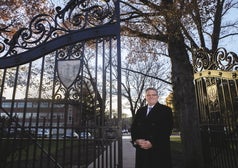Devens a model for smart planning
 James B. Eldridge
James B. Eldridge
Voters in Ayer, Harvard and Shirley approved rezoning of nearly 33 acres of land at Devens during three simultaneous town meetings last month that will allow commercial and industrial projects on a 40-acre site. The site had been zoned for residential development but will become the largest parcel of land available for commercial use in the area; and it is highly likely to attract businesses from the life science and technology sectors.
Devens, a regional enterprise zone located in Ayer, Harvard and Shirley, was created by the Massachusetts legislature in 1993 to spur economic development in the state's North Central region. According to a 2016 report by the University of Massachusetts Donahue Institute, the 4,400-acre site is home to a thriving economy that includes businesses in advanced manufacturing, professional scientific and technical services, wholesale trade, and transportation and warehousing. The site's private businesses, government entities, and nonprofit organizations employ nearly 5,000 people, 80 percent of which are private sector jobs, and contributed roughly $2.5 billion in direct and indirect impact to the Massachusetts economy in 2016.
Devens' economic success makes it a model example of how to develop a closed military base. It is also a good example of how smart government regulations and incentives can spur job creation and economic growth. First, the regional enterprise zone would not have been a resounding success had the Devens Enterprise Commission (DEC) not been created to manage the development, or if the state had not authorized a one-time $200-million bond bill for environmental cleanup.
Second, Devens is overseen by MassDevelopment, the state's quasi-governmental finance and development agency. MassDevelopment collaborates with elected officials and local communities to identify community needs. Last month's rezoning vote in Ayer, Harvard and Shirley is a symbol of the importance of this public-private collaboration: After a fairly similar rezoning proposal failed to pass all three towns in 2015, MassDevelopment worked with local town officials to agree that only innovation and technology business uses would be allowed on the rezoned site. This stipulation ensures the prospect of attracting another major biopharmaceutical company to the Nashoba Valley, an industry that has had a positive impact on local communities. Devens already hosts Bristol-Myers Squibb – the drug manufacturer built a biologics and manufacturing facility on 89 acres in 2009 and has developed a partnership with Mount Wachusett Community College to create a campus at Devens so workers are equipped with skills matching the needs of employers.
The commonwealth's economy is robust with one of the lowest unemployment rates and highest wages in the nation. The state's talented and highly-skilled young workforce is attracting companies from all over the world. Unfortunately, the state's economic growth is primarily benefitting high earners as under-employment along with high rents, childcare and healthcare costs are leading to rising inequality and an affordable housing crisis. To address these challenges in a way that does not leave any community behind, it is important that state agencies work with elected officials as well as representatives from the public and local businesses to identify workforce needs for local and regional employers as well as make necessary investments in our Gateway and Edge cities.
James B. Eldridge is the Democratic state senator out of Marlborough, representing Worcester and Middlesex counties.












0 Comments